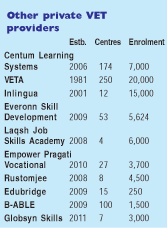Vocational education and training (VET), which is part and parcel of school education and a stream which attracts upto 80 percent of high school leavers in OECD countries as also the newly-emergent economies of Asia, is a blindspot of the Indian education system. Not only is VET unknown in K-12 school education, a mere 3.5 percent of high school leavers opt for vocational education despite there being a huge demand for skilled personnel in all sectors of the economy.
Confronted with the paradox of massive skilled personnel shortages in an economy with 40 million registered unemployed, in October 2009 the Union government and several representative associations of industry including CII, FICCI and Assocham, belatedly promoted the National Skills Development Corporation (NSDC), a PPP (public-private partnership organisation) with a corpus of Rs.1,000 crore, to fund competent education entrepreneurs and NGOs to promote VET centres countrywide.
Since then, a growing number of private companies, entrepreneurs and NGOs have entered the VET space to make good the neglect of the past 64 years. According to VET experts, of the targeted 500 million skilled people by 2022, more than 70 percent will be trained by private sector companies and NGOs.
Some of the major private VET providers are profiled below.
Don Bosco Tech
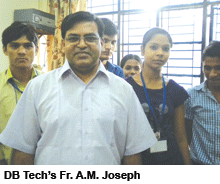 Promoted by the Salesian order of Don Bosco (aka Salesian Society), the Delhi-based Don Bosco Tech (DB Tech) comprises 125 skills training centres in 25 states countrywide. DB Tech is India’s largest non-government organisation in the VET sector, with its well-equipped centres providing vocational education and training to over 45,000 youth — mostly from underprivileged socio-economic backgrounds — annually, at tuition fees ranging from Rs.500-1,000 per course. In June 2010, the Bosco Academy for Skills and Employment (BASE) signed a PPP with the Union ministry of rural development under which it is committed to skill 2 million youth in rural India by 2020.
Promoted by the Salesian order of Don Bosco (aka Salesian Society), the Delhi-based Don Bosco Tech (DB Tech) comprises 125 skills training centres in 25 states countrywide. DB Tech is India’s largest non-government organisation in the VET sector, with its well-equipped centres providing vocational education and training to over 45,000 youth — mostly from underprivileged socio-economic backgrounds — annually, at tuition fees ranging from Rs.500-1,000 per course. In June 2010, the Bosco Academy for Skills and Employment (BASE) signed a PPP with the Union ministry of rural development under which it is committed to skill 2 million youth in rural India by 2020.
Excerpts from an interview with Fr. A.M. Joseph, executive director of DB Tech.
What in your opinion is the USP of DB Tech?
We are a more than century old organisation offering VET to India’s youth much before the need was felt. Our reach — there’s a Don Bosco centre from Kashmir to Kanyakumari and Port Blair to Porbandar — infrastructure, and commitment is perhaps unparalleled despite our being a charitable organisation charging minimum fees. Our experience of working in rural areas especially for the poor is another distinguishing feature of DB Tech.
How satisfied are you with the pace of growth of DB Tech?
We’re an old religious order spreading the work of our founder. What we have achieved is satisfactory, but we are not complacent.
How enabling are Central and state government policies for establishing new VET centres?
With skills development emerging as a high priority subject on the national agenda, the policies of the Central government have changed considerably. Earlier, we never got any monetary help from the government. But now we have partnered with the Union ministry of rural development to skill youth in villages. I believe this is a good start.
What are your future plans?
Of the 500 million youth to be trained by 2020 under the Skill Development Mission, 2 million will be trained by us. That is an ambitious target but quite achievable given our nationwide presence, experience and goodwill.
Indian Institute of Job Training
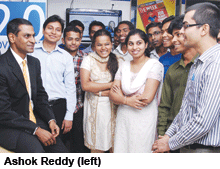 Acquired in 2010 by Teamlease, India’s largest staffing solutions company with 75,000 employees, the Bangalore-based Indian Institute of Job Training (IIJT, estb. 2006) has transformed into a vocational education and training (VET) major with over 120 centres spread across 60 cities countrywide. Its vast repertoire of VET programmes includes short-term (three-16 months) diploma courses in finance, retail, infotech, sales and marketing priced at Rs.2,500-4,500 per month, a rigorous student aptitude and skills assessment system, modern curriculums and strong emphasis on hands-on learning. Moreover, the proposed TeamLease University will be India’s first exclusively focused on VET.
Acquired in 2010 by Teamlease, India’s largest staffing solutions company with 75,000 employees, the Bangalore-based Indian Institute of Job Training (IIJT, estb. 2006) has transformed into a vocational education and training (VET) major with over 120 centres spread across 60 cities countrywide. Its vast repertoire of VET programmes includes short-term (three-16 months) diploma courses in finance, retail, infotech, sales and marketing priced at Rs.2,500-4,500 per month, a rigorous student aptitude and skills assessment system, modern curriculums and strong emphasis on hands-on learning. Moreover, the proposed TeamLease University will be India’s first exclusively focused on VET.
The IIM-Bangalore educated Ashok Reddy is managing director of IIJT and co-founder of TeamLease. Excerpts from an interview.
Unique sales proposition of IIJT.
Students come to IIJT to become job-ready and land a job. IIJT rests on the two pillars of ‘industry relevance’ and ‘employer connection’ and operates as a private employment exchange that also provides quality job training.
What would you say is the most significant impact of IIJT on the VET sector?
We train our students according to industry expectations. The TeamLease National Employment Framework researches the sectoral needs of industry and inputs it back into the curriculum. We map jobs across all industries to develop ideal, job-ready workers and technicians. In this respect, the TeamLease National Employment Framework is unique in this country. Our mission is to solve the problem of unemployability, not unemployment. Moreover, through our association with state governments we are reaching the interiors of the country where the number of unemployable youth is huge and rising.
Future plans. The prime objective of TeamLease-IIJT is fixing the 3Es — employment, employability and education. To attain this, we will expand our network of centres, diversify course offerings, increase capacity utilisation, create market linkages and employment. Our goal is to become the best vocational training provider in the country. Moreover, our proposed TeamLease University with a network of 22 community colleges across Gujarat will be India’s first varsity focused on vocational education. The first ten community colleges will become operational within the next 18 months.
IndiaCan Education
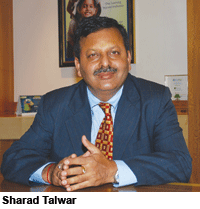 A 50:50 joint venture between the Delhi-based ICT education major Educomp Solutions Ltd and the UK-based education conglomerate Pearson Group, IndiaCan Education Pvt. Ltd bills itself as the country’s largest vocational education and training company with a “pan-India presence in over 200 retail centres and over 150 technical colleges”. Since it began operations in 2009 amid great expectations given its blue-chip lineage, IndiaCan has lived up to its promise by training over 50,000 people and inking several PPPs with state governments. By the end of 2011, it plans to promote 100 VET centres across the country.
A 50:50 joint venture between the Delhi-based ICT education major Educomp Solutions Ltd and the UK-based education conglomerate Pearson Group, IndiaCan Education Pvt. Ltd bills itself as the country’s largest vocational education and training company with a “pan-India presence in over 200 retail centres and over 150 technical colleges”. Since it began operations in 2009 amid great expectations given its blue-chip lineage, IndiaCan has lived up to its promise by training over 50,000 people and inking several PPPs with state governments. By the end of 2011, it plans to promote 100 VET centres across the country.
An alumnus of IIT-Kharagpur and IIM-Ahmedabad, with over 21 years experience in top corporates such as Dell, GE Capital, HCL, HP and Convergys, Sharad Talwar is the Delhi-based CEO of IndiaCan. Excerpts from an interview.
What is the USP of IndiaCan?
IndiaCan was promoted to provide certified job skills through innovative learning systems, and bridge the gap between employment oppor-tunities and skills and knowledge of unemployed youth across the country. IndiaCan is creating a talent pipeline for several industries by offering cust-omised study programmes to upskill large numbers of youth. We have already trained more than 50,000 people across a range of verticals.
How satisfied are you with the pace of growth of IndiaCan?
We have been able to quickly establish a nationwide presence across verticals such as sales/retail, media, English etc. Moreover, we are playing a significant role in government-run schemes for skilling underprivileged youth.
How enabling are Central and state government policies for establishing new VET centres?
We are working closely with govern-ment agencies for training youth in underprivileged, neglected sections of society. Our government partners include the Union ministry of rural development, Rajasthan Mission of Skills and Livelihood and Gujarat Urban Development Mission. Moreover, we are also working with the Indian Army to train jawans in spoken English and employability skills.
What are your future growth and development plans?
In just 18 months, IndiaCan has established a pan-India presence in over 200 retail centres and over 150 technical colleges. We plan to scale up by building a franchisee network, and expanding our reach to tier III and IV towns and to rural areas, where skills training is an urgent requirement, by investing in technology, particularly VSAT-enabled centres.
IndiaSkills
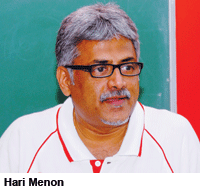 Promoted in September 2009, IndiaSkills is another high-potential VET initiative of two heavyweights — Manipal Education Group (MEG), India’s largest private provider of higher and professional education (see p.46) and the London-based City & Guilds, the world’s largest provider of vocational education, which annually certifies 1.8 million people around the world in 600 vocations. Since the joint venture’s first centre was inaugurated in March 2010 in Hyderabad, IndiaSkills has built a network of 75 centres in 70 cities in 15 states countrywide, delivering training to 4,500 students in retail, hospitality, banking and finance, engineering, construction etc. Its target is to certify and place 1 million learners, trained in 500 IndiaSkills centres by 2015.
Promoted in September 2009, IndiaSkills is another high-potential VET initiative of two heavyweights — Manipal Education Group (MEG), India’s largest private provider of higher and professional education (see p.46) and the London-based City & Guilds, the world’s largest provider of vocational education, which annually certifies 1.8 million people around the world in 600 vocations. Since the joint venture’s first centre was inaugurated in March 2010 in Hyderabad, IndiaSkills has built a network of 75 centres in 70 cities in 15 states countrywide, delivering training to 4,500 students in retail, hospitality, banking and finance, engineering, construction etc. Its target is to certify and place 1 million learners, trained in 500 IndiaSkills centres by 2015.
An alumnus of BITS Pilani, Hari Menon, who worked with ORG Systems, TVS Electronics, Wipro Infotech and MEG, is chief executive of IndiaSkills. Excerpts from an interview.
USP of IndiaSkills.
Our course content, training delivery and assessment methodologies are based on City & Guilds’ 130 years of inter-national experience. City & Guilds offers over 600 qualifications spanning 30 industry sectors and IndiaSkills has the resources to adapt, design, develop and deliver these qualifications to meet the specific skilling requirements of Indian industry. MEG’s network of 700 centres across the country significantly adds to our pan-India delivery capability.
How satisfied are you with your pace of growth?
IndiaSkills is a significant player in India’s VET sector — we will have the largest number of skills development programmes by next year. This is a significant achievement for any company in a short span of two years.
How enabling are Central and state government policies for establishing new VET centres?
Existing government policies are not focused on helping organisations to establish new VET centres. The system is fragmented with rules, regulations and terms varying with each department and project. Bureaucratic intervent-ions make it very difficult for VET centres to operate freely.
What are your future growth and development plans?
Our immediate goal is to introduce 48 job-oriented VET programmes by end March 2012. This will make us the largest skilling organisation in India measured by the number of VET programmes offered. We aim to train and certify a million youth in 500 vocational centres within the next five years. We will achieve this target by forming partnerships with government, corporates, educational institutions, NGOs and entrepreneurs.
Laurus Edutech
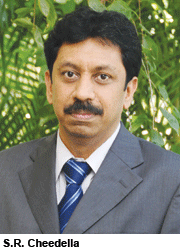 On October 18, the Chennai-based Laurus Edutech Pvt. Ltd signed a memorandum of understanding with the National Skills Development Corpor-ation (NSDC), under which Laurus will upskill 1.1 million youth in 540 vocational education and training centres countrywide. This agreement will transform Laurus Edutech (estb. 2008), which has already established 89 owned, franchised and partnership skill centres in 70 cities countrywide, into a major provider of VET. This fast-growing company delivers certification in 30-plus trades such as welding, carpentry, plumbing, electrician, fitter, air-conditioning, refrigeration, auto-mobile, textiles, electronics, etc at tuition fees ranging from Rs.500-12,000 per month. Excerpts from an interview with Srinivas Rao Cheedella, managing director of Laurus Edutech.
On October 18, the Chennai-based Laurus Edutech Pvt. Ltd signed a memorandum of understanding with the National Skills Development Corpor-ation (NSDC), under which Laurus will upskill 1.1 million youth in 540 vocational education and training centres countrywide. This agreement will transform Laurus Edutech (estb. 2008), which has already established 89 owned, franchised and partnership skill centres in 70 cities countrywide, into a major provider of VET. This fast-growing company delivers certification in 30-plus trades such as welding, carpentry, plumbing, electrician, fitter, air-conditioning, refrigeration, auto-mobile, textiles, electronics, etc at tuition fees ranging from Rs.500-12,000 per month. Excerpts from an interview with Srinivas Rao Cheedella, managing director of Laurus Edutech.
What is the USP of Laurus Edutech?
Laurus Edutech is perhaps the most cost-effective VET provider in India. We use new technologies to operate, monitor and track our VET centres, and our website www.skillindia.in matches our alumni with employers in Indian industry.
How satisfied are you with the pace of growth of Laurus?
Laurus has grown very aggressively from two centres in 2008 to 89 currently. Recently we also signed up with NSDC to establish 540 centres countrywide for upskilling 1.1 million youth over the next ten years.
How enabling are Central and state government policies for establishing new VET centres?
Some VET programmes require govern-ment accreditation. The accreditation process is cumbersome and requires streamlining. Unfortunately, industry demands government-certified progra-mmes. Previously, skills development initiatives attracted minimal industry participation. However, this is fast changing with the government starting to collaborate with private VET providers through public-private partnerships.
What are your future growth and development plans?
Apart from the massive NSDC-funded project, we intend to expand our centres and the number of VET programmes we offer. We will also support corporate social responsibility initiatives that support skills development. Hence all our VET programmes include values, ethics, soft skills and English language education.
